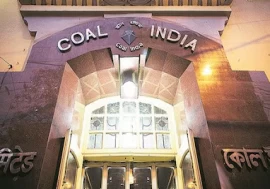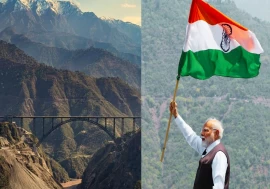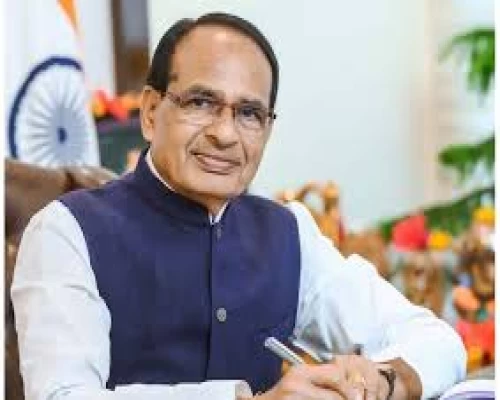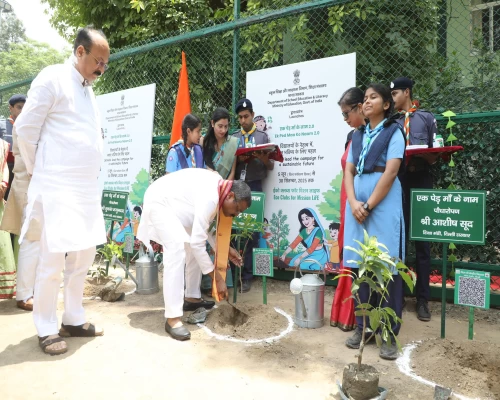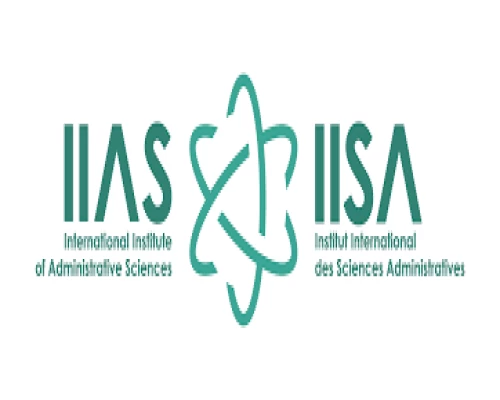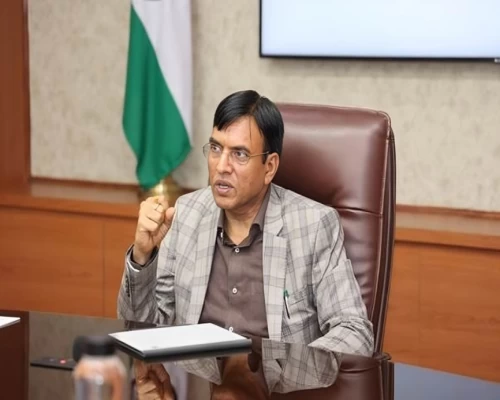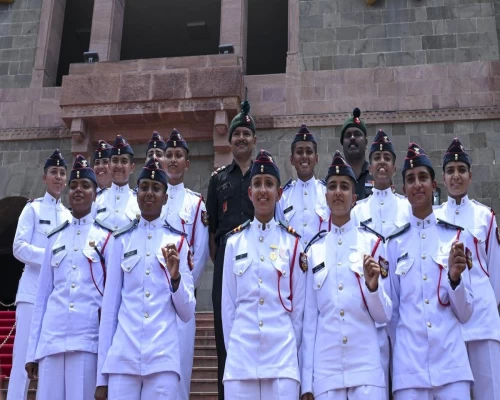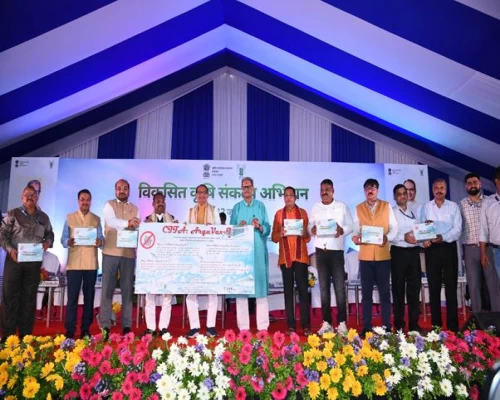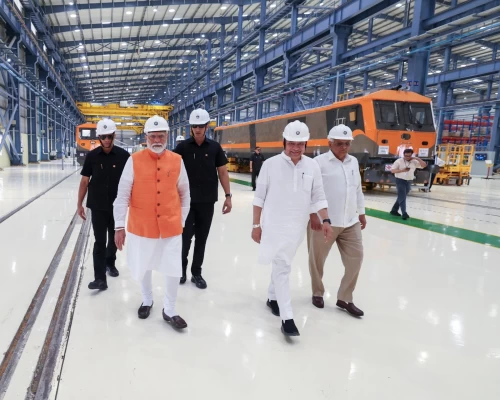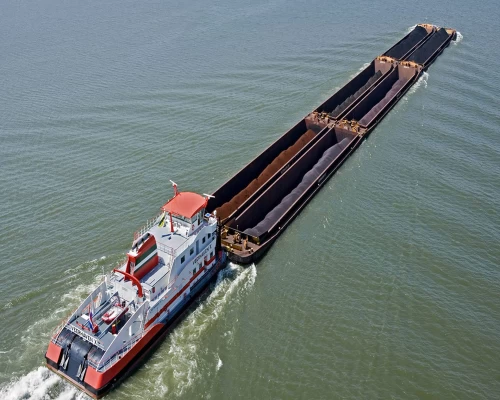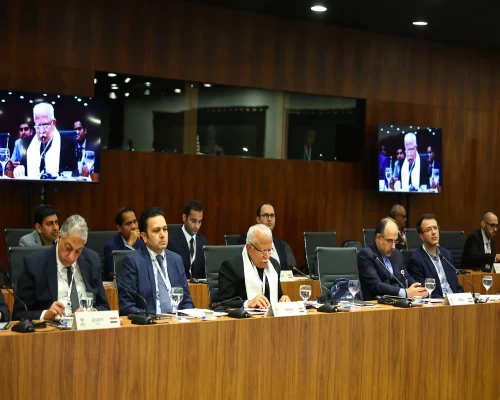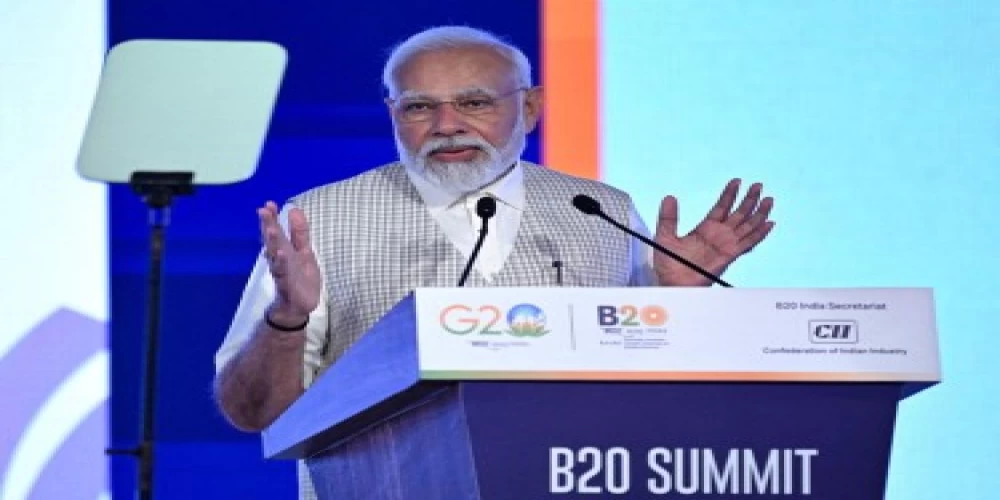
New Delhi: The Prime Minister Narendra Modi addressed the B20 Summit India 2023 in New Delhi on Sunday. B20 Summit India brings policymakers, business leaders and experts from across the world to deliberate and discuss the B20 India Communique. The B20 India Communique includes 54 recommendations and 172 policy actions for submission to G20.
Addressing the gathering, the Prime Minister emphasized the celebratory moment that was ushered in by the successful Chandrayaan Mission landing on 23rd August. He said India’s festive season has advanced, and society as well as businesses are in a celebratory mood. Noting the role of ISRO in the successful Lunar mission, the Prime Minister also acknowledged the role of the industry in the mission as many components of Chandrayaan were provided by the private sector and MSMEs. “This is a success of both science and industry”, he said.
He continued that along with India, the entire world is celebrating and this celebration is about running a responsible space programme. The Prime Minister said that the celebrations are about responsibility, acceleration, innovation, sustainability and equality, the theme of today’s B20. He further added that it is about humanity, and about ‘One Earth, One Family and One Future’
Speaking about the B20 theme ‘R.A.I.S.E.’, the Prime Minister said that even though the ‘I’ represents innovation but he pictures another ‘I’ of inclusiveness. He informed that the same vision has been applied when inviting the African Union to permanent seats at the G20. Even in B20, the Prime Minister said that the economic development of Africa is identified as a focus area. “India believes that the inclusive approach of this forum will have a direct impact on this group”, the Prime Minister said. He noted that the successes of the decisions taken here will have a direct impact in dealing with global economic challenges and creating sustainable growth.
Talking about the lessons learnt from the once in a century calamity i.e. the Covid-19 pandemic, Modi said that that the pandemic taught us that the thing that needs most of our investment is ‘mutual trust’. The Prime Minister said that as the pandemic shattered the edifice of mutual trust, India stood with confidence and humility raising the banner of mutual trust. India, the Prime Minister said, made medicines available to more than 150 countries, living up to its status as the pharmacy of the world. Similarly, vaccine production was increased to save crores of lives. The Prime Minister said that India's democratic values show in its action and its response. He said, “India’s democratic values show in G20 meetings in more than 50 cities of India.”
Emphasizing the attractiveness of partnership with India for the global business community, the Prime Minister mentioned India’s young talent pool and its digital revolution. “The more your friendship deepens with India, the more prosperity accrue to both”, PM Modi added.
He said “business can transform potential into prosperity, obstacles into opportunities, aspirations into achievements. Whether they are small or big, global or local, business can ensure progress for everyone.” Therefore, the Prime Minister said, “the future of global growth is dependent upon the future of business”.
Throwing light on the transformations in life that have occurred with the onset of Covid 19 pandemic, the Prime Minister noted the irreversible change of disruptions in the global supply chain. Questioning the efficiency of the global supply chain that ceased to exist when the world required it the most, the Prime Minister underlined that India is the solution to the disruptions that the world is dealing with today. He highlighted India’s position in creating a trusted supply chain in the world today and emphasized the contributions of global businesses.
Expressing happiness that B20 has emerged as a robust platform among businesses of G20 nations, PM Modi stressed the need to focus on sustainability. He asked global business to move forward as sustainability, in itself, is an opportunity as well a business model. He elaborated this by giving an example of millet which is a super food, environment friendly as well as good for small farmers making it a win-win model from the angle of both economy and lifestyle. He also mentioned the circular economy and green energy.India’s approach of taking the world along is visible in steps like the International Solar Alliance.
In the post corona world, the Prime Minister observed that every individual has become extra conscious about their health and its impact is clearly visible in day-to-day activities. He also noted that people are looking ahead to the futuristic impact of any such activity. Giving strength to this belief, the Prime Minister said that businesses and the society should have a similar approach towards the planet and analyze the impact of their decisions on the planet. “The well being of the planet is also our responsibility”, the Prime Minister added. Speaking about Mission LiFE, the Prime Minister said that the objective of this mission is to create a group or a collective of Pro Planet People. He underlined that half of the issues will be reduced when both the lifestyle and the businesses are pro planet. He emphasized adapting life and business according to the environment and informed about India preparing a framework of green credit for business, which emphasizes on planet positive actions. The Prime Minister urged all the stalwarts of global business to join hands and make it a global movement.
The Prime Minister asked for a reconsideration of the traditional approach to business. He said that there is a need to go beyond brand and sales. He said, “As a business, we also have to focus on creating an ecosystem that will benefit us in the long term. Now, Due to the policies implemented by India in the past few years, 13.5 crore people have come out of poverty in just 5 years. These people are the new consumers. This neo middle class is also giving momentum to India's growth. That is, the net beneficiary of the work done by the government for the poor is our middle class as well as our MSMEs.” The Prime Minister stressed that businesses should focus on improving the purchasing power of more and more people as a self centric approach will harm everyone. Referring to a similar challenge of uneven availability and universal need in critical material and rare earth metals, Prime Minister Modi said, “If those who have them do not look at them as global responsibility then it will promote a new model of colonialism.”
The Prime Minister underlined that a profitable market can be sustained when there is a balance in the interests of producers and consumers, and it also applies to nations. He stressed that treating other countries only as a market will not work but harm even the producing countries sooner or later. He emphasized that the way forward is to make everyone equal partners in this progres. He urged the business leaders present on the occasion to give thought to making businesses more consumer-centric where these consumers could be individuals or countries. He said that their interests need to be taken care of and suggested coming up with a yearly campaign for this. “Every year, can global businesses come together to pledge themselves for the good of the consumers and their markets”, the Prime Minister asked, according to a PIB press release.
Modi asked the global business to fix a day to talk about the interest of the consumer. He asked, “When we talk about consumer rights, should not we also be mindful of consumer care as it will automatically take care of many consumer rights issues? We should definitely think about a system for 'International Consumer Care Day. This will help in strengthening trust between businesses and consumers”, said Prime Minister Modi. He elaborated that consumers are not confined to retail consumers within a particular geography but also the nations that are consumers of global trade, global goods and services.
Noting the presence of the world's business leaders, the Prime Minister raised significant questions and said that the future of business and humanity will be decided by the answers to these questions. Regarding the answers, Modi said that mutual cooperation is necessary to answer them. He underlined that issues like climate change, energy sector crisis, food supply chain imbalance, water security, cyber security etc. have a big impact on business, and stressed on increasing the efforts to counter this. He also touched upon issues that no one could have thought of 10-15 years ago and gave the example of challenges related to cryptocurrencies. The Prime Minister stressed the need for a more integrated approach in this matter and suggested creating a global framework where issues of all stakeholders can be addressed. He also spoke about a similar approach needed regarding artificial intelligence. Highlighting the buzz and excitement around AI, the Prime Minister drew attention to some ethical considerations regarding skilling and re-skilling, and concerns regarding algorithm bias and its impact on society. “Such issues have to be resolved together. Global business communities and governments will have to work together to ensure that Ethical AI expands”, the Prime Minister asserted and stressed on sensing the potential disruptions in different sectors.
Concluding the address, the Prime Minister said that businesses have successfully gone beyond borders and boundaries but it is now time to take businesses beyond the bottomline. He said that it can be carried out by focusing on supply chain resilience and sustainability. PM Modi expressed confidence that the B20 Summit has paved the way for a collective transformation. “Let us remember that a connected world is not just about connection through technology. It is not only about shared social platforms but also about a shared purpose, shared planet, shared prosperity and a shared future”, the Prime Minister remarked. /BI/


